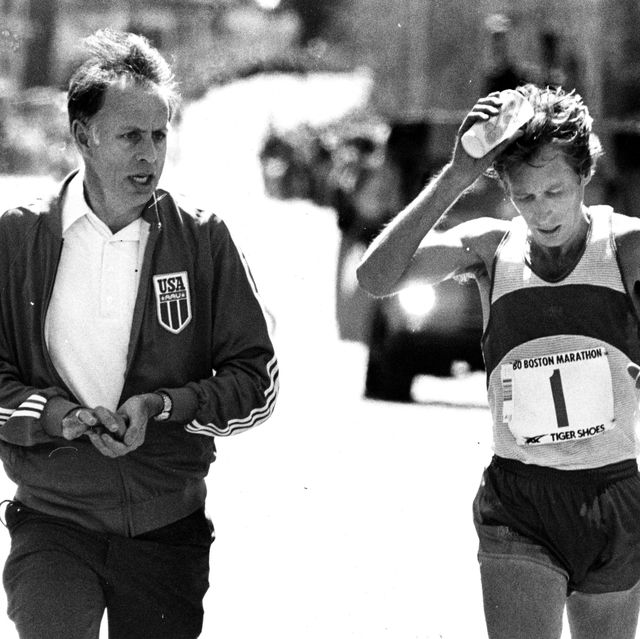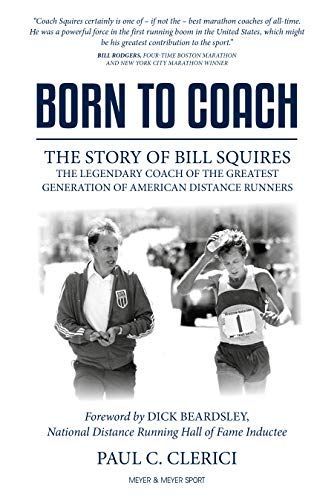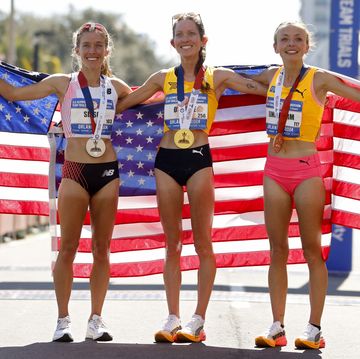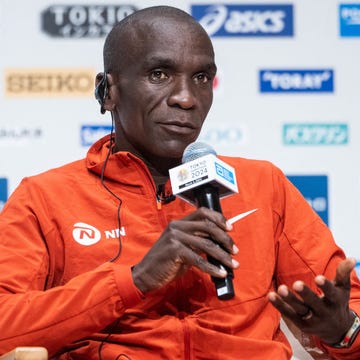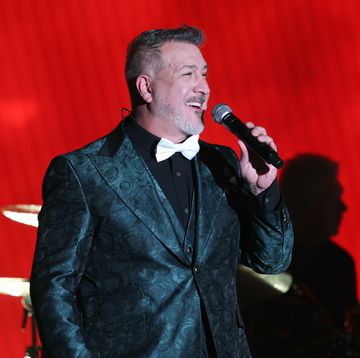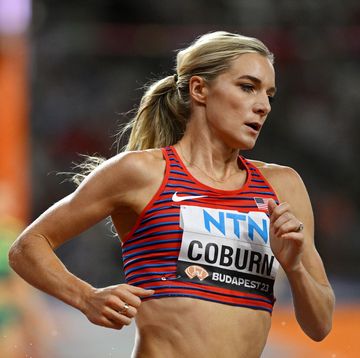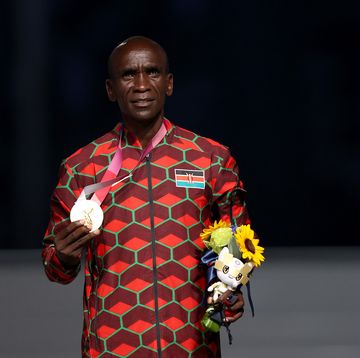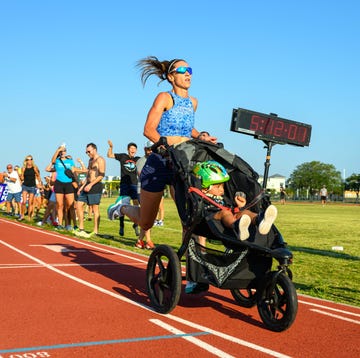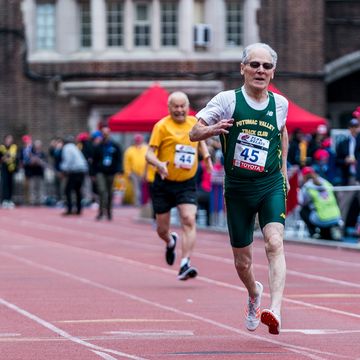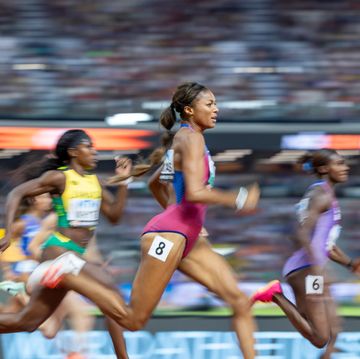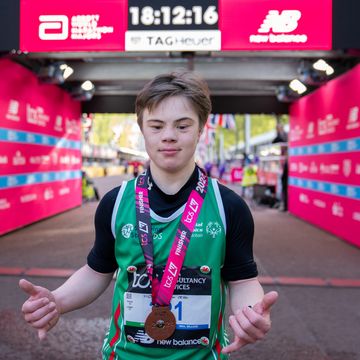Bill Squires, the Boston coach who mentored six Boston Marathon winners and helped inspire the first running boom, died on June 30. He was 89.
Squires had three successful careers in running: as a standout college miler in the 1940s, as an encouraging high school and college coach in the 1950s–60s, and as the force behind many members of America’s greatest running generation from the mid 1970s on. Bill Rodgers, Jack Fultz, Alberto Salazar, Greg Meyer, Canadian Jacqueline Gareau, and wheelchair pioneer Bob Hall, all winners at the Boston Marathon, were guided at some point by Squires.
In the legendary “Duel in the Sun” Boston of 1982, Squires had advised both duelists, Salazar and Dick Beardsley, as well as Rodgers (fourth that day) and Gareau (second). When the Greater Boston Track Club won the Boston Marathon team race in 1978 and 1979, Squires had nurtured their lesser-known runners as well as those on the podium. When the unknown Beardsley was cowinner of the inaugural London Marathon in 1981, it was Squires who talked the organizers into inviting him, promising to refund his airfare if he didn’t perform.
Squires’s legacy goes deep into the sport, because he was consistently successful as a team coach. He fostered loyalty and aspiration, and he devised developmental structures and group training that aided runners of all abilities. In the 1960s, he was among the first to envision and promote post-collegiate track and field in America, which proved key to the first running boom. He also help broaden the sport of road running in that era by his advocacy for women and wheelchair racers.
William Joseph Squires was the eldest child in an Irish immigrant family in Arlington, Massachusetts, near Boston, and he spent his whole life close to there, apart from the years he spent on an athletic scholarship at Notre Dame and in the Army.
According to a 2020 biography, Born to Coach: The Story of Bill Squires, by Boston writer Paul Clerici, as a child, Squires was kept reluctantly sedentary, because of anxieties over a heart murmur. But when a different specialist gave permission for full activity, the 11-year-old Squires eagerly compensated. He ran everywhere, played with a recklessness that brought injuries to his eye, nose, and foot, and discovered hockey and football. At Arlington High School, he won three state championships and set a school mile record of 4:22.6.
At Notre Dame, he ran cross country and indoor and outdoor track, sometimes racing five times in a one-day meet to gain team points. He graduated with a B.S., was an All-American, and set at least 20 school track records.
Squires came quite close to Olympic selection, placing seventh (in 4:08) in the 1956 NAAU Championships, one of the Olympic trial meets. During Army service, when he was a specialist based in Germany investigating Army air crashes, he improved to a 4:07 mile, and 3:47.6 for 1500 meters.
A visit to England at that time changed his ideas on the value of high-mileage training. He added endurance work to his own schedule, and combined it, when he started coaching, with what he called “simulation” of race pace and tactics.
In 1958, he started teaching biology at Wakefield High School, 10 miles from Arlington. He soon became involved in coaching and had immediate team success with his group training. He continued to run and in 1961, at 28, ran 2:47:46 in the Boston Marathon. But under the amateurism rules of that time, he was banned as a “professional” because he was paid for coaching.
In 1964, Squires was appointed associate professor and coach at Boston State College. He retained that post when the college merged with University of Massachusetts Boston in 1971, and he retired in 1991, at age 58. His group training methods were again successful, and his teams won 49 team championship titles, and produced four NCAA champions and 16 All-Americans. Squires was National Intercollegiate Coach of the Year three times and received numerous Hall of Fame inductions and similar honors.
He was especially proud that many of his athletes went on to become coaches. Colorfully eccentric (the word “wacky” is often used to describe him), and speaking in a personal idiom that could be a challenge to decipher, Squires was also accessible and generous with positive reinforcement. In his idiosyncratic way, he was an inspiring teacher who convinced every athlete of his personal belief in them.
“I totally believed everything he told me,” Beardsley often said. “If he had told me to go sit in a garbage can, I’d have done it.”
In 1973, Squires began to fulfill his vision of a post-collegiate American sport when he was one of the founders of the Greater Boston Track Club (GBTC). This required diplomacy, as Squires was also a member of the rival BAA, and worked annually with Jock Semple in processing Boston Marathon entries.
With GBTC, he proved adroit in adapting successful high school and college training methods to international-level athletes. Again, the team was Squires’ main focus, and under his guidance GBTC won 17 national championships, produced six individual champions, seven American records, and was regarded as the best distance running club in America. He pressured meets like the Penn Relays to include track events appropriate to post-collegiate distance runners.
As marathons boomed, runners who were coached at some point by Squires won Amsterdam, Auckland, Boston, Chicago, Fukuoka, London, New York, San Francisco, Twin Cities, the U.S. Olympic Trials, and other important races. Double Olympic marathoner Pete Pfitzinger, Chicago and Twin Cities winner Phil Coppess, and national 10K champion Bob Hodge are among the many other elites who acknowledge the value of his advice.
He was regarded with affection by the running community, especially in the Boston area. A 2011 Runner’s World profile claimed “Everybody has a Bill Squires story.”
Squires was for four years a consultant with New Balance, and he also coached employees of Boston sponsor John Hancock. Frequently an invited speaker, with many engagements overseas, in 1971 he was invited to India for three months to help that nation prepare for the 1972 Olympics. His main recognition at national level, when he was appointed U.S. distance coach for the 1980 Olympics, was negated by the American boycott of those Games.
Squires’s 1956 marriage to Sally Ann Kuhn, a hospital surgery nurse, who grew up in Arlington two streets from the Squires home, ended in divorce in 1979. They had three children.
Squires willingly shared his ideas, in person with a vigorous if incoherent volubility, and in several books, including Improving Your Running, Improving Women’s Running, Speed With Endurance (with Bruce Lehane), and Fast Tracks: The History of Distance Running (with Raymond Krise).
For a Runner’s World profile, Squires at age 78 revealed how he wanted to be remembered: “My hope is that when I drop there’ll be five or six guys around the United States who say, ‘You know, that friggin’ guy knew what he was doing.’ I have improved every athlete I’ve ever coached. Every one! Even the wackos.”
An invariable part of the Squires legend is his habit of rapidly scribbling a detailed individual training schedule on a table napkin, typically at the Eliot Lounge, in its heyday as the social center of Boston running. Some of these inscribed napkins survive and will be appropriate relics.
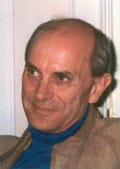
Roger Robinson is a highly-regarded writer and historian and author of seven books on running. His recent Running Throughout Time: the Greatest Running Stories Ever Told has been acclaimed as one of the best ever published. Roger was a senior writer for Running Times and is a frequent Runner’s World contributor, admired for his insightful obituaries. A lifetime elite runner, he represented England and New Zealand at the world level, set age-group marathon records in Boston and New York, and now runs top 80-plus times on two knee replacements. He is Emeritus Professor of English at Victoria University of Wellington, New Zealand, and is married to women’s running pioneer Kathrine Switzer.
